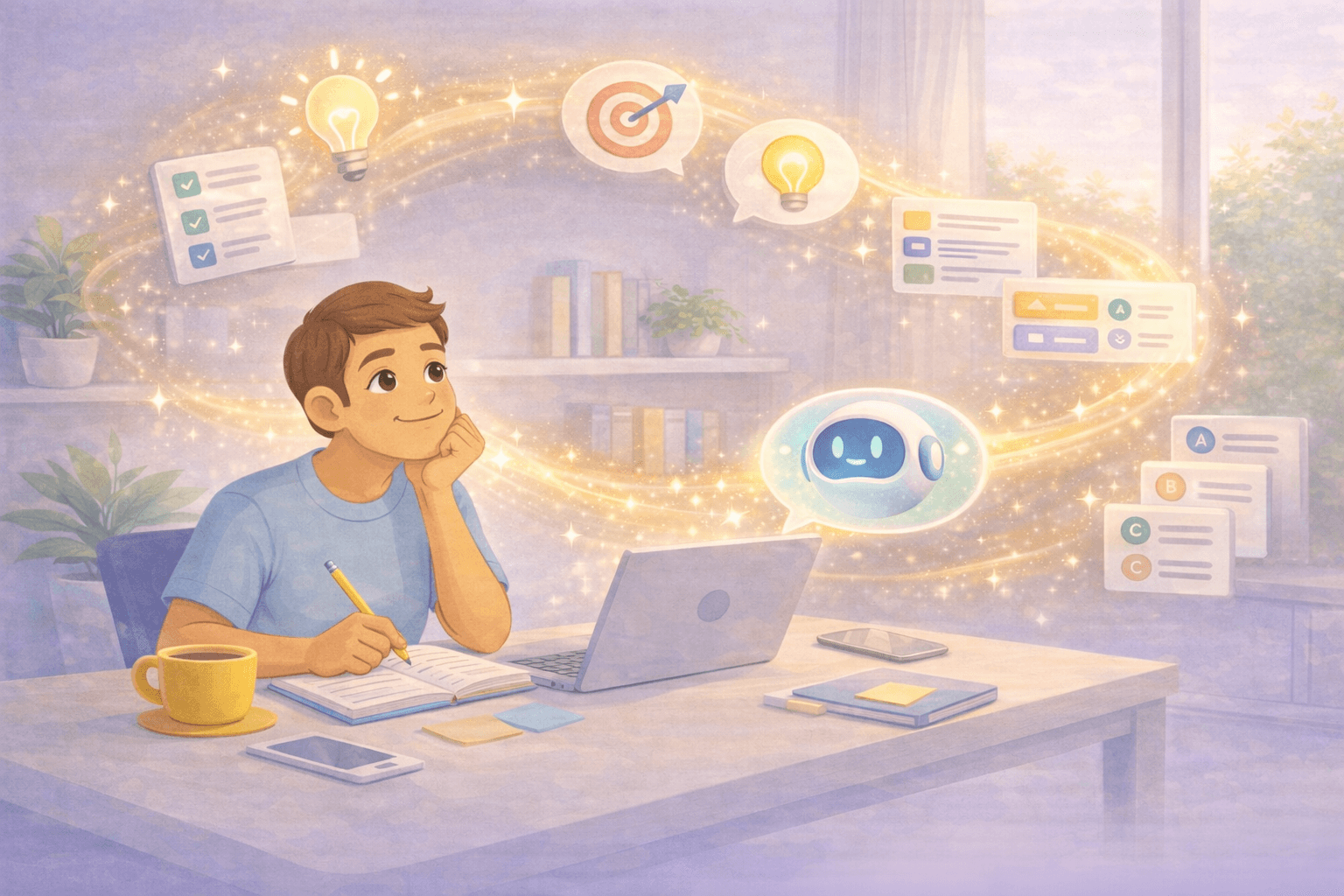Curating knowledge
Alternatives to ChatGPT for Course Creation
L&D managers and business owners are increasingly using AI chatbots such as ChatGPT to create training courses. But when it comes to course creation, did you know there are more effective tools and platforms that can overcome limitations associated with ChatGPT? Let’s explore these alternatives and how they can better meet your organization’s needs.

Ryan Macpherson
Aug 28, 2024



Editor:
Stephanie Chan
Why Seek Alternatives to ChatGPT?
While ChatGPT is a powerful tool for generating text and answering basic questions, it is less effective at executing more complex tasks such as building a training course in corporate environments. Here’s why:
Data security concerns
ChatGPT often involves sending data generated from prompts to external servers. This process might not comply with your workplace’s data security policies and regulations, particularly if your organization handles sensitive or confidential information.
Lack of tailored training solutions
Training programs should be customized to align with your organization’s unique culture, workflows, and goals. ChatGPT's general-purpose nature means it might generate content that is too generic, lacking the specificity needed to address your workforce’s requirements. As a result, your courses may not be effective in helping you meet training goals and employee development needs.
Learner diversity
Learners have different learning styles and preferences. For example, some may be visual learners, while others may prefer to read blocks of text. The generic nature of ChatGPT makes it harder for you to successfully address these varying requirements.
Specialized functionalities
Your training course may require specialized features beyond ChatGPT's capabilities. For instance, if you want to design an interactive or collaborative learning experience, other platforms might be better suited to meet those needs.
Types of Alternatives to ChatGPT
Due to the above limitations, it might be time to consider the below alternatives that may work better to suit your L&D requirements. Each option offers unique features and capabilities designed to enhance the learning experience.
Interactive eLearning platforms
These platforms provide interactive and customizable training modules that can be tailored to specific learning objectives. Examples include LinkedIn Learning, an online education platform that offers a vast library of professional courses with interactive elements and assessments, and Skillsoft, a cloud-based learning management system (LMS) providing a variety of eLearning resources, including interactive videos and simulations.
Collaborative learning tools
These tools are designed to enhance collaboration and communication among employees, making the learning process more engaging and effective, especially when integrated with an LMS. For example, Microsoft Teams can be used within an LMS environment to facilitate blended learning delivery. Similarly, Slack allows trainers to integrate bots that deliver learning content and facilitate discussions within channels.
Microlearning platforms
Microlearning platforms provide learners with short bursts of focused content, ensuring optimal knowledge retention in minimal time. Designed to be easily digestible, microlearning content can come in the form of flashcards, quizzes, training videos, and guides. A prime example of a microlearning platform is Coassemble, which offers AI-powered course creation capabilities, allowing you to quickly convert documents into engaging learning materials or generate a course from a prompt.
What’s the Difference Between ChatGPT and an AI Course Creator?
ChatGPT is an AI chatbot that allows you to have human-like conversations to complete simple tasks, while AI course creators are tools that use AI technology to assist in creating online courses. AI course creators offer several advantages over ChatGPT, including the following:
Content creation and customization
ChatGPT generates text-based content in response to user prompts. It can provide explanations, examples, and answer questions based on its training data. While ChatGPT can create general course content and answer questions, it may struggle with highly specific or complex course requirements. Using ChatGPT to generate course content will also only provide you with text-based content.
In contrast, AI course creators are designed specifically for educational content development. They use advanced natural language processing (NLP) and machine learning (ML) algorithms tailored to educational contexts to generate, organize, and customize course material based on predefined learning objectives and user inputs.
Document transformation
ChatGPT generates responses based on textual input but does not inherently support document transformation from formats like PDFs, PPTs, or Word files into structured or coherent course content.
Meanwhile, AI course creators can convert documents into comprehensive courses with minimal effort. This process involves extracting key information, reformatting it into a learner-friendly structure, and integrating it with multimedia elements. They can help you seamlessly convert a PDF into a structured course module, create quizzes from slide decks, or generate interactive elements from Word documents. The transformation is often automated and streamlined, significantly reducing the time and effort required for course development.
Scalability and efficiency
While ChatGPT can generate content rapidly, scaling this content or integrating it into a formal course structure involves manual effort. Additionally, managing and adapting this content for diverse learning needs while ensuring consistency across different modules may require significant human intervention.
In comparison, AI course creators are specifically designed for scalability in educational settings. They can handle the creation of large-scale training programs efficiently thanks to their ability to automate content generation, assessments, and feedback mechanisms. Moreover, AI course creators can support a diverse range of learners simultaneously by adjusting content dynamically based on learner data and interactions. This means they can quickly adapt to different class sizes, course formats, and educational environments without compromising quality.
For a deeper dive on AI course creators, check out our blog article What is an AI Course Builder.
Other Challenges with ChatGPT for Course Creation
Using ChatGPT to create courses affects the quality and effectiveness of your course material. Here are some other key challenges to consider:
Measuring success
Whilst ChatGPT can help with drafting written content for a course, it cannot offer you built-in analytics and insights into course effectiveness. Without these insights, it’s difficult to measure the success and impact of training programs.
Customization and data access
The limited customization options and restricted data access associated with ChatGPT may hinder your ability to create personalized courses tailored to specific user personas.
Interactive learner experience
Effective courses often include interactive elements like videos, hands-on activities, and real-time feedback. While ChatGPT can provide text-based interaction, it cannot offer multimedia content, quizzes, or the level of interactivity that is vital for student engagement.
Siloed experience
ChatGPT operates as a standalone tool and does not embed within other products or connect directly to existing training modules, which can lead to a fragmented learning experience for your learners.
AI-powered course creation
Looking for a comprehensive, AI-powered solution for microlearning course creation? Explore Coassemble’s AI Microlearning Course Generator for free today. With intuitive design and seamless integration capabilities, Coassemble stands out as a leading alternative for creating efficient and tailored training programs to meet your organization’s specific needs and goals.
AI Course Builder FAQs
How does an AI course builder improve the course creation process?
AI course builders streamline the course creation process by automating repetitive tasks, such as content generation and assessment design. They can analyze existing materials to suggest improvements, identify gaps in content, and adapt courses to meet the varying needs of learners. This results in faster development times and higher-quality educational materials. Additionally, these tools simplify the process of creating and selling online courses, enabling educators to generate passive income.
Can AI course builders personalize learning experiences?
AI course builders enable you to tailor your online training to specific learner audiences by adjusting for factors such as language proficiency, prior knowledge, and tone of voice. This flexibility allows you to quickly modify and customize your training programs to meet the diverse needs of different groups within your organization.
Are AI course builders suitable for any industry?
AI course builders are versatile and can be used across various industries that require training and education solutions, such as healthcare, IT, education, finance, and customer service.
What are the main challenges associated with using AI course builders?
Some AI course builders may ask for significant initial data input or request an integration with existing systems. In contrast, Coassemble allows you to easily create a course from scratch using a simple prompt in a matter of minutes.
Discover the Power of AI Technology for Course Creation
AI course builders are transforming the way organizations develop and deliver training programs, offering unprecedented efficiency, customization, and scalability. These tools make it easier than ever to create and market online courses, providing a cost-effective solution for educators and businesses alike.
To experience the future of course creation, explore Coassemble’s AI Course Generator today.
Read More
Join the knowledge revolution today
Unlock knowledge. Boost engagement. Drive results
No credit card required

Join the knowledge revolution today
Unlock knowledge. Boost engagement. Drive results
No credit card required

Join the knowledge revolution today
Unlock knowledge. Boost engagement. Drive results
No credit card required




